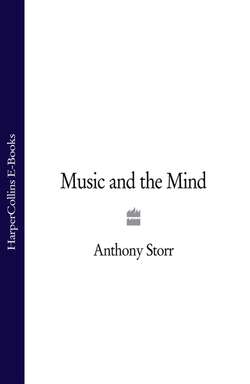Читать книгу Music and the Mind - Anthony Storr - Страница 6
Introduction
ОглавлениеSince music is the only language with the contradictory attributes of being at once intelligible and untranslatable, the musical creator is a being comparable to the gods, and music itself the supreme mystery of the science of man.
CLAUDE LÉVI-STRAUSS1
Today, more people listen to music than ever before in the history of the world. The audience has increased enormously since the Second World War. Recordings, radio, and even television, have made music available to a wider range of the population than anyone could have predicted fifty years ago. In spite of dire warnings that recordings might empty opera houses and concert halls, the audience for live performances has also multiplied.
This book reflects my personal preference in that it is primarily concerned with classical or Western ‘art’ music, rather than with ‘popular’ music. That these two varieties of music should have become so divergent is regrettable. The demand for accessible musical entertainment grew during the latter half of the nineteenth century in response to the increased wealth of the middle class. It was met by Offenbach, both Johann Strausses, Chabrier, Sullivan, and other gifted composers of light music which still enchants us today. The tradition was carried on into the twentieth century by composers of the stature of Gershwin, Jerome Kern, and Irving Berlin. It is only since the 1950s that the gap between classical and popular music has widened into a canyon which is nearly unbridgeable.
In spite of its widespread diffusion, music remains an enigma. Music for those who love it is so important that to be deprived of it would constitute a cruel and unusual punishment. Moreover, the perception of music as a central part of life is not confined to professionals or even to gifted amateurs. It is true that those who have studied the techniques of musical composition can more thoroughly appreciate the structure of a musical work than those who have not. It is also true that people who can play an instrument, or who can sing, can actively participate in music in ways which enrich their understanding of it. Playing in a string quartet, or even singing as one anonymous voice in a large choir, are both life-enhancing activities which those who take part in them find irreplaceable. But even listeners who cannot read musical notation and who have never attempted to learn an instrument may be so deeply affected that, for them, any day which passes without being seriously involved with music in one way or another is a day wasted.
In the context of contemporary Western culture, this is puzzling. Many people assume that the arts are luxuries rather than necessities, and that words or pictures are the only means by which influence can be exerted on the human mind. Those who do not appreciate music think that it has no significance other than providing ephemeral pleasure. They consider it a gloss upon the surface of life; a harmless indulgence rather than a necessity. This, no doubt, is why our present politicians seldom accord music a prominent place in their plans for education. Today, when education is becoming increasingly utilitarian, directed toward obtaining gainful employment rather than toward enriching personal experience, music is likely to be treated as an ‘extra’ in the school curriculum which only affluent parents can afford, and which need not be provided for pupils who are not obviously ‘musical’ by nature. The idea that music is so powerful that it can actually affect both individuals and the state for good or ill has disappeared. In a culture dominated by the visual and the verbal, the significance of music is perplexing, and is therefore underestimated. Both musicians and lovers of music who are not professionally trained know that great music brings us more than sensuous pleasure, although sensuous pleasure is certainly part of musical experience. Yet what it brings is hard to define. This book is an exploratory search; an attempt to discover what it is about music that so profoundly affects us, and why it is such an important part of our culture.
